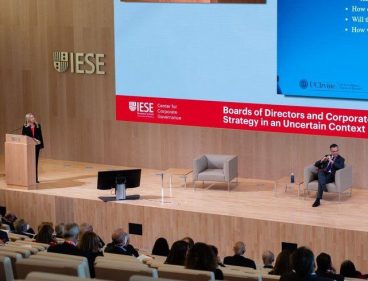Center for Corporate Governance (CCG)
Center for Corporate Governance (CCG)
President: Jordi Canals
Companies are facing unprecedented disruptions and challenges (i.e. technological, geopolitical or environmental). The boards of director’s mission to govern effectively is more relevant than ever to develop trustworthy, sustainable and resilient companies that have a lasting positive impact on society.
Created in 2018, the IESE Center for Corporate Governance is engaged in impactful research, educational programs, academic conferences and dialogue forums between academics, practitioners, investors, board members and regulators to exchange experiences and knowledge. It aims to contribute to improve governance models and practices grounded on evidence-based research which have a deep impact on how companies build and implement sustainable value creation strategies for the long term.
The mission of the Center for Corporate Governance is to generate impactful ideas on corporate governance grounded on evidence-based research and help bridge the gap between theory and practice in the field of corporate governance. We aim to improve not only the quality, but also the basic assumptions on corporate governance: the firm’s foundation on purpose and values; the professional quality of management; and the long-term value creation for all stakeholders involved.
Join us for the 2025 Corporate Governance Conference in Madrid on March 31 dedicated to shareholders’ role and responsibilities in times of corporate disruptions.
- Corporate Sustainability Reporting Directive: What Should Directors Know? In our November newsletter, Professor Gaizka Ormazabal shares his thoughts on some of the main issues that directors need to be aware of in order to implement the Corporate Sustainability Reporting Directive. Read more here.
- 2024 IESE – ECGI Corporate Governance Conference The 2024 IESE – ECGI Corporate Governance Conference, Towards a New Model of Boards of Directors, took place on April 15, 2024 at IESE’s Madrid campus. Know more about the event here.
- What Should Boards Prioritize in 2024? The latest edition of the IESE Survey on Boards of Directors addresses four key challenges for boards: implementation of corporate purpose and culture; board competencies and dynamics; CEO leadership development and succession planning; and business strategy and the impact of geopolitics. Read the full study here.
- Board of Directors and Artificial Intelligence. Boards of directors should seek to understand and govern artificial intelligence since it has the potential to change many companies’ competitive positioning while providing opportunities to accelerate productivity and efficiency. Some reflections on this topic can be found in the November newsletter of the Center. Read here.
- Executive Compensation Tied to ESG Performance: International evidence. A new global study conducted by IESE’s Gaizka Ormazabal and Igor Kadach, together with Shira Cohen of San Diego State University and the University of Mannheim’s Stefan Reichelstein, looks at the prevalence of ESG-linked pay for executives, and where and which companies are adopting the practice. The research examines the role of institutional investors in encouraging ESG pay, as well as its impact on firm performance. Read more here.
-
Common Ownership, Competition and Top Management Incentives. A growing body of empirical evidence ties common ownership to reduced competition, and research recently published in the Journal of Political Economy by IESE’s Miguel Antón and Mireia Giné, with Florian Ederer of Boston University and Martin Schmalz of the University of Oxford, connects the dots between CEO compensation, increased common ownership of public companies, and incentives that discourage aggressive competition. Read more here.
-
Boards of Directors in Disruptive Times: Improving Corporate Governance Effectiveness. A recent article by professor Jordi Canals, posted on the Harvard Law School Forum on Corporate Governance, discusses the need of a new governance model guided by purpose where shareholders, boards of directors and senior managers are fully aligned to develop companies for the long term. This post is based on his book Boards of Directors in Disruptive Times (Cambridge University Press, 2023), which has recently received the Joan Sardà Dexeus 2023 Award in the category of best book on Economics and Business. Read the full article here.
- Modern Capitalism and Corporate Purpose. Professors Jordi Canals and Gaizka Ormazabal participated in the conference “Perspectives on Corporate Purpose” organized by the European Corporate Governance Institute (ECGI) that took place in Copenhagen last September 21, 2023. The conference was part of the Corporate Purpose pillar of ECGI’s Responsible Capitalism Initiative and consisted of 5 sessions where academics and practitioners examined the opportunities and challenges presented by corporate purpose and the evidence of its contribution to business success, investor performance and wider societal and environmental interests. Watch the sessions of the event here.
- The Future of China and US Rivalry and Its Impact on Companies. Former Singaporean Minister George Yeo, with Professor Jordi Canals, offered a session on “The future of China and US rivalry and its impact on companies“, which was part of the IESE Alumni Learning Program.In the session, that took place in Barcelona last October 19, 2023, Mr. George Yeo gave some useful insights to better understand China, the growing geopolitical conflict with the U.S. and its effects on the global business landscape.
- Revisiting the Anticompetitive Effects of Common Ownership. Professors Xavier Vives and José Azar have been awarded the 2023 Intesa Sanpaolo Finance Prize for their paper “Revisiting the Anticompetitive Effects of Common Ownership”.
- Climate Finance. IESE Professor Nuno Fernandes has recently published CLIMATE FINANCE, a book where he offers a useful guide to address climate-related financial issues, risks and opportunities and disentangles the complex layers of decision-making around it.
- 2022 IESE Survey on Boards of Directors. This survey aims at understanding how board directors analyze and work on four relevant themes for the quality of corporate governance and the effectiveness of boards of directors: corporate purpose, culture, strategy and board engagement.
- Boards of Directors in Disruptive Times. It’s high time to do better, asserts IESE Professor Jordi Canals in his 2022 book, Boards of Directors in Disruptive Times: Improving Corporate Governance Effectiveness. In 10 chapters, Canals offers a detailed analysis explaining why the prevailing model of corporate boards is falling short in our current era of accelerated change and radical transformation.
Boards of directors
- Improving boards of directors’ effectiveness
- Boards of directors and corporate strategy
- Boards of directors and corporate culture
- Governance and executive compensation
- CEO succession
Shareholders
- Influence of institutional investors
- Institutional investors and stewardship
- Governance of listed firms, family-owned business and foundations
- Shareholder activism
Purpose in corporate governance
- Corporate purpose in governance
- Corporate purpose and business performance
- Corporate purpose and culture
- Corporate purpose and ESG
Governing ESG & Sustainability
- Sustainability impact
- ESG measurement, accountability and disclosure
- Sustainable finance
- Impact investment
IESE-ECGI Corporate Governance Conference Series
The IESE Center for Corporate Governance and the European Corporate Governance Institute (ECGI) bring senior academics and thought-leaders in business to discuss relevant corporate governance topics through conferences.
Corporate Governance Insights
JANUARY 2025 NEWSLETTER
Is Executive Compensation Becoming “One-Size-Fits-All”?
DECEMBER 2024 NEWSLETTER
A Framework for Positive Board – CEO Collaboration
- Newsletter November 2024 – issue #60. The Corporate Sustainability Reporting Directive: What Every Board Should Keep in Mind
- Newsletter October 2024 – issue #59. Hiring a Suitable CEO
- Newsletter September 2024 – issue #58. Board Behavioral Dynamics: Implications for Board Effectiveness
- Newsletter June 2024 – issue #57. Is CEO Succession Planning a Priority for Boards of Directors?
- Newsletter May 2024 – issue #56. Towards a New Model of Boards of Directors
- Newsletter April 2024 – issue #55. What Makes an Effective Board: Insights from New Survey Data
- Newsletter March 2024 – issue #54. Environmental Risk Readiness: Strategies for Top Executives and Boards
- Newsletter February 2024 – issue #53. CEOs Political Views: Should They Matter?
- Newsletter January 2024 – issue #52. How Should Boards Think About Strategy?
- Newsletter December 2023 – issue #51. Sustainability Disclosure Regulation: Is It Effective?
- Newsletter November 2023 – issue #50. Boards of Directors and Artificial Intelligence
- Newsletter October 2023 – issue #49. Relevant Shareholders and Corporate Governance
- Newsletter September 2023 – issue #48. Setting the Tone at the Top: How Boards Can Help Teamness in the Executive Suite
- Newsletter June 2023 – issue #47. Climate Finance: What Board Members Need to Know
- Newsletter May 2023 – issue #46. Carbon Accounting: What Every Board Director Should Know
- Newsletter April 2023 – issue #45. Boards, Geopolitics and Corporate Strategy
- Newsletter March 2023 – issue #44. ESG Factors and Corporate Culture
- Newsletter February 2023 – issue #43. An Agenda for Effective Boards
- Newsletter January 2023 – issue #42. Crypto, Regulation and Governance
- Newsletter December 2022 – issue #41. Evaluating Corporate Governance Effectiveness in a Rapidly Evolving Context
- Newsletter November 2022 – issue #40. The Influence of Culture in Corporate Governance
- Newsletter September 2022 – issue #39. Boards of Directors Should Look Beyond the Crisis
- Newsletter July 2022 – issue #38. ESG-Linked Pay
- Newsletter June 2022 – issue #37. How Do Board Directors Look at Critical Board Functions?
- Newsletter May 2022 – issue #36. Corporate Governance: The Role of Corporate Culture
- Newsletter April 2022 – issue #35. Boards of Directors and the Return of Geo-Political Risks
- Newsletter March 2022 – issue #34. Sustainability Strategy Needs Global Standards
- Newsletter February 2022 – issue #33. Boards, Corporate Strategy and Activist Investors
- Newsletter January 2022 – issue #32. Boards of Directors, Hedge Fund Activism and Strategic Decision Making
- Newsletter November 2021 – issue #31. The role of boards of directors in corporate strategy
- Newsletter September 2021 – issue #30. Governance relationships between shareholders: Learnings from private equity investments in family firms
- Newsletter June 2021 – issue #29. Lessons About Corporate Governance from Venture Capital-Backed Companies
- Newsletter May 2021 – issue #28. Changing while keeping the substance: The role of governance
- Newsletter April 2021 – issue #27. Should Boards of Directors Care About People?
- Newsletter March 2021 – issue #26. The Board Towards the Future
- Newsletter February 2021 – issue #25. Sustainability Reporting: Where are we at and where are we heading?
- Newsletter January 2021 – issue #24. Real Versus Rhetorical Environmental Actions: What’s Their Impact on Corporate Reputation?
- Newsletter December 2020 – issue #23. Should Corporate Governance Enter into a New Era with Purpose? A Business Model Perspective
- Newsletter November 2020 – issue #22. Do We Need Corporate Purpose to Improve Corporate Governance?
- Newsletter October 2020 – issue #21. Purpose with a Soul
- Newsletter September 2020 – issue #20. Corporate Governance and Corporate Purpose: The Ongoing Debate
- Newsletter July 2020 – issue #19. Shareholder Involvement in Times of COVID-19
- Newsletter June 2020 – issue #18. Can Boards Afford Purpose and Sustainability During the Pandemic?
- Newsletter May 2020 – issue #17. Boards Need to Think Beyond the COVID19 Crisis
- Newsletter April 2020 – issue #16. Some Unique Challenges for Boards of Directors
- Newsletter March 2020 – issue #15. The 2025 Board
- Newsletter February 2020 – issue #14. What are the Implications of the Sustainable Development Goals (SDG) for Corporate Governance?
- Newsletter January 2020 – issue #13. Are the Big Three’s Corporate Governance Activities Contributing to Reducing Carbon Emissions?
- Newsletter December 2019 – issue #12. The role of board of directors in M&As
- Newsletter November 2019 – issue #11. Is Technology Disrupting our Corporate Governance System?
- Newsletter October 2019 – issue #10. Some features of investor activism in Europe. How should companies prepare?
- Newsletter September 2019 – issue #9. Business Roundtable moves corporate purpose forward
- Newsletter July 2019 – issue #8. Corporate criminal liability in Europe: some implications for corporate governance
- Newsletter June 2019 – issue #7. On Purpose and Governance
- Newsletter May 2019 – issue #6. Responsible investment: What does it mean for boards of directors?
- Newsletter April 2019 – issue #5. Corporate culture and values. How can the board of directors set the tone?
- Newsletter March 2019 – issue #4. Corporate governance for company continuity
- Newsletter February 2019 – issue #3. Can shareholder activism reduce our carbon footprint?
- Newsletter January 2019 – issue #2. Great boards get engaged in the company’s strategy
- Newsletter November 2018 – issue #1. Corporate Governance for Long-Term Growth
Leadership Team
Faculty Team
Videos.
Towards a New Model of Boards of Directors
The 2024 IESE-ECGI Corporate Governance Conference focused on the theme: “Towards a New Model of Boards of Directors”. The different speakers helped analize and debate how boards of directors can navigate challenges like climate change and sustainability, strategy and digital transformation, and CEO succession planning. Leading scholars from various fields, along with CEOs and chairpersons, offered insights on improving governance in today’s disruptive environment.
Corporate Governance, Corporate Culture and the Board’s Culture
The 2022 IESE-ECGI Corporate Governance Conference discussed the role of corporate culture in corporate governance from the specific perspective of the board of directors as the top decision-maker in an organization with a cross-disciplinary approach.
Boards of Directors and Corporate Strategy in an Uncertain Context
The 2021 IESE-ECGI Corporate Governance Conference discussed the role of boards of directors when dealing with corporate strategy in a context where the level of uncertainties that companies face is increasing.
Can Purpose Deliver Better Corporate Governance?
Corporate purpose has galvanized a global movement that promises to restore trust in companies, to produce goods and services without doing harm, while providing a fair return to employees and shareholders. The 2020 IESE-ECGI Corporate Governance Conference discussed the connection between corporate purpose and governance.
Corporate Governance and Ownership with Diverse Shareholders
The 2019 IESE-ECGI Corporate Governance Conference offered a context to reflect upon and better understand how the different nature of shareholders have an impact on the way companies are governed and managed, and, eventually, on some key decisions that define corporate governance –like board composition, board dynamics, CEO hiring and firing, strategy making and incentives design.
The importance of corporate governance
IESE professor Jordi Canals explains why corporate governance matters and how to create a good corporate governance system that prevents self-interest-seeking behavior by the top management of a company.
What are the seismic shifts affecting corporate governance?
Harvard Business School’s Krishna Palepu spoke at IESE on the impact of scandal on business in recent years, shifts towards compliance, the role of boards in determining strategy, and how to deal with the delicate issue of stakeholder activism.
Accountable managers, responsible companies. Lessons from the crisis: emerging shareholder activism
Responsible investment has become a $32 billion reality, integrating social, environmental and governance issues in portfolio decisions. Meanwhile, the say-on-pay movement, rather than driving managers out, has become a vote of confidence in the CEO. In the wake of the crisis, emerging shareholder activism comes with benefits to investors and the broader society.
Boards and shareholders redrawing their boundaries
Board-shareholder dynamics have been evolving since the financial crisis. In this interview, Harvard Business School professor Jay Lorsch discusses a business environment still struggling to regain societal trust and the potential influence of new shareholder empowerment on board decisions.
Programs.
The Center collaborates with all IESE Executive Education Programs. The programs related to corporate governance currently available are:





























